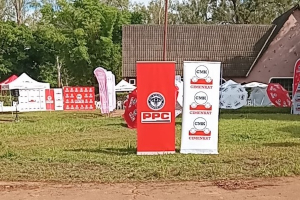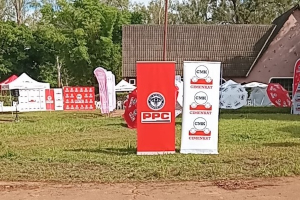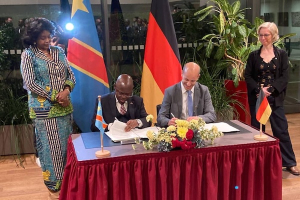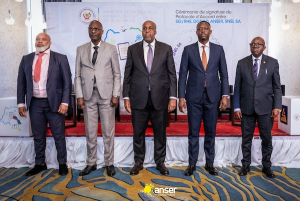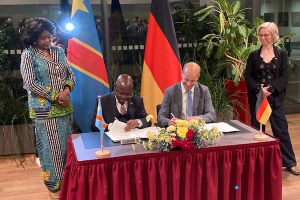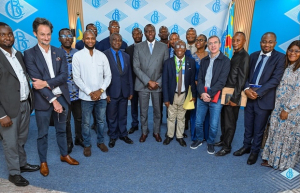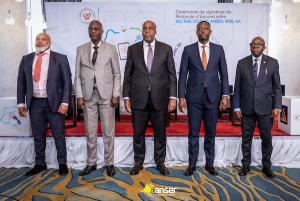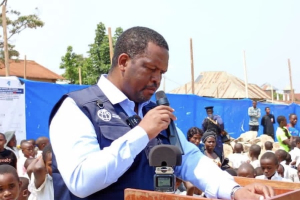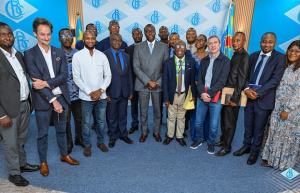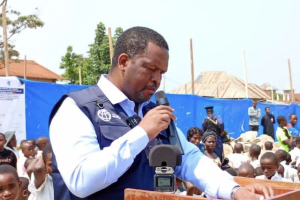Equipe Publication
Cimentkat teams up with PPC Barnet to restart limestone mining in Lubudi
The first limestone extraction blast under Project Albatros took place in December 2025 in Lubudi, in the Lualaba province. The project results from a partnership between Ciments du Katanga (Cimentkat or Cimenkat) and PPC Barnet RDC and focuses on the exploitation of a high-grade limestone deposit owned by Cimentkat.
According to the chief executive officer of PPC Barnet RDC, the initial objective is to extract at least 600,000 tons of crushed limestone per year, with a gradual move toward the production of limestone powder and lime. These products serve as key inputs for the construction materials industry and for various industrial applications.
Lubudi holds a long-standing place in the cement industry of the Democratic Republic of Congo. Cimentkat has operated industrial facilities in the area since its creation in 1922. After supplying construction materials for decades to support industrial development in Katanga, the company saw its activity decline steadily, leading to a production halt more than ten years ago.
“The restart of Cimentkat is now a reality through Project Albatros,” said Léon Mwine, chairman of Cimentkat’s board of directors.
PPC Barnet RDC is a joint venture between South Africa’s PPC Ltd and the Congolese group Barnet. The company operates an integrated cement plant in Kimpese, in the Kongo Central province, with an estimated annual production capacity of about 1.2 million tons of cement.
Boaz Kabeya
Calcaire : Cimentkat s’allie à PPC Barnet pour relancer l’exploitation à Lubudi
Le premier tir d’extraction de calcaire du projet Albatros a eu lieu en décembre 2025 à Lubudi, dans la province du Lualaba. Ce projet est le fruit d’un partenariat entre Ciments du Katanga (Cimentkat ou Cimenkat) et PPC Barnet RDC, et porte sur l’exploitation d’un gisement de calcaire à forte teneur appartenant à Cimentkat.
Selon le directeur général de PPC Barnet RDC, l’initiative vise « déjà exploiter au moins 600 000 tonnes de calcaire concassé chaque année, et de monter progressivement vers la production de la poudre calcaire et la chaux ». Ces produits sont utilisés comme intrants dans l’industrie des matériaux de construction et dans diverses applications industrielles.
Le territoire de Lubudi est historiquement lié à l’industrie du ciment en République démocratique du Congo. Cimentkat y exploite des installations industrielles depuis sa création en 1922. Après avoir répondu pendant plusieurs décennies aux besoins en matériaux de construction liés au développement industriel du Katanga, l’entreprise a vu ses activités décliner progressivement, jusqu’à un arrêt de production intervenu il y a plus d’une décennie.
« La relance de Cimentkat est effective aujourd’hui au travers du projet Albatros », a indiqué le président du conseil d’administration (PCA) de Cimentkat, Léon Mwine.
PPC Barnet RDC est issue d’un partenariat entre le groupe sud-africain PPC Ltd et le groupe congolais Barnet. L’entreprise exploite une cimenterie intégrée située à Kimpese, dans la province du Kongo Central, avec une capacité de production annuelle estimée à environ 1,2 million de tonnes de ciment.
Boaz Kabeya
Lire aussi :
Mines : Cimenkat, Golden Africa et d’autres sociétés perdent leurs titres
Cimenterie nationale : vers la relance d’activités avec Avic-Conch
Ciment : le Chinois WIH Cement en voie de devenir le premier producteur en RDC
Germany commits €161mln to key infrastructure and security projects in DR Congo
Germany plans to commit €161 million, or about $189 million at current exchange rates, to technical and financial cooperation projects in the Democratic Republic of Congo over the 2025–2026 period. The announcement was made at an economic forum held in Berlin from December 8 to 9, 2025, which brought together Congolese and German business operators around sectors including agriculture, energy, water, mining, and pharmaceuticals.
The funding will support projects in several priority areas, including security, mining governance, biodiversity and forest protection, access to drinking water, and the development of renewable energy. On peace and social cohesion, Berlin plans targeted support for eastern provinces—North Kivu, South Kivu, Ituri, and Tanganyika—with a focus on assisting conflict victims and affected communities.
In the mining sector, Germany aims to promote transparency, improve the business environment, and support economic development, with particular attention to the Lobito corridor. This strategic infrastructure seeks to connect mining regions in the DR Congo to the Atlantic port of Lobito in Angola.
On biodiversity and forests, the announced interventions target conservation of the Congo Basin, with expected benefits for local populations.
In renewable energy, Germany plans to support implementation of the national energy compact and the Mission 300 initiative. Special emphasis is placed on the Inga III hydropower project, presented as a key driver for electricity access and industrial development.
These initiatives align with priorities set out in the National Strategic Development Plan (PNSD) 2024–2028 and the government’s Action Program (PAG).
By way of background, during the last intergovernmental negotiations in 2023, Germany’s Federal Ministry for Economic Cooperation and Development committed €90 million to the DR Congo. In addition, a major humanitarian assistance program deployed in 2024 totaled an estimated €54.7 million.
Ronsard Luabeya
DR Congo moves to tighten electricity levy collection in Kinshasa
The Democratic Republic of Congo has taken steps to strengthen the collection of the electricity consumption levy, following the signing of a memorandum of understanding in Kinshasa on December 18, 2025.
The agreement was signed under the supervision of the minister of Water Resources and Electricity, Aimé Sakombi Molendo, and brings together the Directorate General of Administrative, Judicial, State and Participation Revenues (DGRAD), the national power utility SNEL, the National Agency for Electrification and Energy Services in Rural and Peri-Urban Areas (ANSER), and the ministry’s secretariat general.
According to a statement from ANSER, the partnership seeks to improve the supervision, collection, and control of the electricity consumption levy, which is intended to finance electrification projects through ANSER and the National Electrification Fund (FONER). The levy forms part of the institutional framework of the power sector and aims to support expanded electricity access in a country where the electrification rate remains below 22%.
In principle, the mechanism relies on contributions from large electricity consumers, particularly high- and medium-voltage users, to finance sector investments. However, implementation has faced recurring challenges, including difficulties in identifying calculation bases, weaknesses in collection procedures, and limited oversight, resulting in irregular revenue mobilization.
The new protocol seeks to address these shortcomings through the introduction of a single declaration form for the levy, placed under the authority of the supervising ministry. It also establishes a revenue-sharing formula, with proceeds split equally between the public treasury and ANSER.
Focus on transparency and control
Under the agreement, SNEL, designated as the legal taxpayer, will submit monthly levy declarations within regulatory deadlines to the ministry’s secretariat general and to ANSER, with copies sent to DGRAD for information. Each declaration must include a detailed schedule listing final customers, contact details, amounts due, and related technical data.
SNEL will also issue debit notes and collection notices and extend the levy to medium-voltage customers supplied through its own installations, in order to broaden the tax base.
The parties agreed to set up a technical coordination framework, including a joint commission and combined inspection missions. These bodies will be responsible for identifying non-compliant customers and recovering unpaid levies covering the period from October 2024 to July 2025.
Minister Sakombi Molendo said the protocol reflects an inter-institutional governance approach aimed at making levy collection more predictable, fair, and transparent. SNEL’s chief executive, Teddy Lwamba, said the utility would comply with the new procedures, while pointing to operational constraints linked to high- and medium-voltage customers.
DGRAD said it intends to further strengthen non-tax revenue mobilization and plans to propose an additional protocol to clarify recovery procedures on behalf of ANSER, including the role of the treasury receiver and regular reconciliation of financial data.
Ronsard Luabeya
Lobito, Inga III, sécurité… : l’Allemagne annonce 161 millions d’euros pour la RDC
L’Allemagne prévoit d’injecter 161 millions d’euros, soit près de 189 millions de dollars au taux actuel, dans la mise en œuvre de projets de coopération technique et financière en République démocratique du Congo (RDC) sur la période 2025-2026. Cet engagement a été annoncé lors d’un Forum économique tenu du 8 au 9 décembre 2025 à Berlin, réunissant des opérateurs économiques congolais et allemands autour de secteurs tels que l’agriculture, l’énergie, l’eau, les mines et l’industrie pharmaceutique.
Les financements annoncés ciblent plusieurs domaines, notamment la sécurité, la gouvernance minière, la biodiversité et les forêts, l’accès à l’eau potable, ainsi que le développement des énergies renouvelables. Sur le plan de la paix et de la cohésion sociale, Berlin prévoit un appui spécifique aux provinces de l’est du pays — Nord-Kivu, Sud-Kivu, Ituri et Tanganyika — afin de soutenir les victimes des conflits armés et leurs communautés.
En matière de gouvernance minière, l’Allemagne entend promouvoir la transparence, l’amélioration du climat des affaires et le développement économique, avec un accent particulier sur le corridor de Lobito. Cette infrastructure stratégique vise à relier les régions minières de la RDC au port atlantique de Lobito, en Angola.
S’agissant de la biodiversité et des forêts, les interventions annoncées visent la préservation du Bassin du Congo, avec des retombées attendues au profit des populations locales.
Dans le secteur des énergies renouvelables, Berlin prévoit d’accompagner la mise en œuvre du Compact énergétique national et de l’initiative Mission 300. Un intérêt particulier est accordé au projet hydroélectrique Inga III, présenté comme un levier structurant pour l’accès à l’électricité et le développement industriel.
L’ensemble de ces projets s’inscrit dans les priorités définies par le Plan national stratégique de développement (PNSD) 2024-2028 et le Programme d’actions du gouvernement (PAG).
Pour rappel, lors des dernières négociations intergouvernementales en 2023, le ministère fédéral allemand de la Coopération économique et du Développement (BMZ) s’était engagé à mobiliser 90 millions d’euros en faveur de la RDC. Par ailleurs, un important programme d’aide humanitaire avait été déployé en 2024, pour une enveloppe estimée à 54,7 millions d’euros.
Ronsard Luabeya
Lire aussi :
Conflit à l’est de la RDC : l’Allemagne suspend ses nouveaux appuis financiers au Rwanda
DR Congo central bank presses money transfer firms to use local currency
The Central Bank of Congo (BCC) has reminded money transfer operators in the Democratic Republic of Congo of their obligation to allow clients to carry out fund transfers in the national currency. The reminder followed a meeting held on December 16, 2025, chaired by BCC Governor André Wameso with executives of the financial messaging firms.
While noting that exchange regulations allow transactions to settle in foreign currencies by mutual agreement, the central bank stressed that no provision authorizes operators to refuse transactions in the national currency. The Congolese franc, the BCC said, holds constitutional status as the official currency of the country.
According to the central bank, several money transfer firms continue to limit access to transfers in Congolese francs, forcing customers to send and receive funds in foreign currencies. Data presented during the meeting showed that more than 80% of domestic transfers, as well as all international transfers handled by these firms, currently settle in foreign currencies.
The BCC said this practice runs counter to the policy direction set by Governor Wameso. Appointed in July, the former economic adviser to President Félix Tshisekedi has made the restoration of confidence in the Congolese franc and a reduction in dependence on the U.S. dollar central priorities of his mandate. The central bank added that wider use of the Congolese franc for transfers, including by the diaspora, would help strengthen foreign exchange reserves and support monetary stability.
In response, the BCC called on transfer operators to guarantee customers the freedom to choose the currency of their transactions, whether the Congolese franc or a foreign currency, in line with existing regulations. It also urged firms to systematically integrate options for sending and receiving funds in Congolese francs across their applications and operational systems.
Ronsard Luabeya
Électricité : Kinshasa cherche à renforcer la collecte de la redevance à la consommation
Le ministre des Ressources hydrauliques et de l’Électricité, Aimé Sakombi Molendo, a présidé le 18 décembre 2025 à Kinshasa la cérémonie de signature d’un protocole d’accord entre la Direction générale des recettes administratives, judiciaires, domaniales et de participations (DGRAD), la Société nationale d’électricité (SNEL), l’Agence nationale de l’électrification et des services énergétiques en milieux rural et périurbain (ANSER) et le secrétariat général aux Ressources hydrauliques et à l’Électricité.
Selon une note de l’ANSER, cette intention de collaboration vise à encadrer la perception et le contrôle de la redevance sur la consommation d’électricité, destinée à financer l’électrification à travers l’ANSER et le Fonds national d’électrification (FONER). Inscrite dans l’architecture institutionnelle du secteur, cette redevance doit soutenir l’extension de l’accès à l’électricité dans un pays où le taux de desserte reste inférieur à 22 %.
Dans son principe, le mécanisme repose sur la contribution des grands consommateurs d’électricité, notamment ceux de haute et moyenne tension (HT/MT), au financement des investissements du secteur. Sa mise en œuvre a toutefois été marquée par des difficultés récurrentes, liées à l’identification des bases de calcul, aux modalités de perception et au contrôle effectif des montants dus, entraînant une mobilisation irrégulière des recettes.
Le protocole entend répondre à ces faiblesses en instaurant un formulaire unique de déclaration de la redevance, établi sous l’autorité du ministère de tutelle. Il fixe également une clé de répartition des recettes à parts égales entre le Trésor public et l’ANSER.
Renforcer la transparence
Désignée comme redevable légal, la SNEL devra déposer chaque mois, dans les délais réglementaires, les déclarations de redevance auprès du secrétariat général aux Ressources hydrauliques et de l’Électricité et de l’ANSER, avec transmission pour information à la DGRAD. Ces déclarations devront être accompagnées d’un tableau détaillant, pour chaque client final, les coordonnées, les montants dus et les données techniques correspondantes.
La SNEL est également chargée d’émettre les notes de débit et les titres de perception, ainsi que d’étendre l’assujettissement aux clients de moyenne tension alimentés par ses propres installations, afin d’élargir l’assiette de la redevance.
Les parties ont convenu de mettre en place un cadre de concertation technique, incluant une commission mixte et des missions conjointes de contrôle, chargées notamment d’identifier les clients non conformes et de recouvrer les droits dus pour la période allant d’octobre 2024 à juillet 2025.
Pour Aimé Sakombi Molendo, ce protocole illustre une démarche de gouvernance interinstitutionnelle visant à rendre la perception de la redevance plus prévisible, équitable et transparente. Le directeur général de la SNEL, Teddy Lwamba, a pour sa part assuré de la disponibilité de l’entreprise à se conformer aux nouvelles procédures, tout en soulignant la nécessité de lever certaines contraintes liées à la clientèle HT/MT.
La DGRAD a enfin indiqué vouloir renforcer la mobilisation des recettes non fiscales, en proposant l’élaboration d’un protocole complémentaire précisant les modalités de recouvrement pour le compte de l’ANSER, la saisine du receveur et la conciliation régulière des données financières.
Ronsard Luabeya
Lire aussi :
Eau et électricité : vers une hausse des tarifs pour soutenir REGIDESO et SNEL
Électricité : vers une restructuration de la dette de la SNEL, évaluée à 3 milliards $
Fonds Mwinda : un premier appel à projets pour électrifier les campagnes
Électricité : la RDC vise 19,5 milliards $ d’investissements privés d’ici 2030
DR Congo launches World Bank-backed infrastructure projects in North Kivu
Authorities in North Kivu launched several basic socio-economic infrastructure projects on December 18 in Beni, under the Stabilization and Recovery Project for Eastern Democratic Republic of Congo (STAR-EST), with financial support from the World Bank.
The launch ceremony took place in Beni and was led by the province’s police vice-governor, Commissioner Louis Segond Karawa. Provincial STAR-EST coordinator Jean-Claude Kasomo said the first phase covers the construction of 26 social infrastructures, including 11 primary schools, three secondary schools, and 12 social centers.
The facilities are spread across 13 sites in the city of Beni, three sites in the Beni territory, four in Lubero territory, and six in Walikale territory. According to Kasomo, the program could later extend to areas currently under armed group control once those zones return to state authority.
Under its current roadmap, the STAR-EST program aims to deliver 130 basic socio-economic infrastructures across its North Kivu intervention area by 2027, subject to an improvement in security conditions. Authorities cited Masisi and Rutshuru as key territories where progress depends on greater stability.
The STAR-EST project carries total financing of $250 million from the World Bank. It became effective in November 2023 and runs through December 2027. The program seeks to strengthen the resilience of vulnerable communities through infrastructure rehabilitation, temporary job creation, and improved access to essential services.
Initially deployed in North Kivu, South Kivu, and Ituri, the program has recently expanded to other provinces, including Kinshasa and Kwango, where investments are underway in the rehabilitation of urban and rural roads.
Boaz Kabeya
Transfert d’argent : la BCC pousse pour l’usage du franc congolais
La Banque centrale du Congo (BCC) a rappelé aux messageries financières opérant en République démocratique du Congo (RDC) leur obligation de permettre aux clients d’effectuer des transferts de fonds en monnaie nationale. Ce rappel a été formulé lors d’une réunion présidée, le 16 décembre 2025, par le gouverneur de la BCC, André Wameso, avec les responsables de ces établissements.
Tout en rappelant que la réglementation des changes autorise le dénouement des opérations en monnaies étrangères sur la base d’un accord entre les parties, la banque centrale précise qu’« aucune disposition ne permet de refuser les transactions en monnaie nationale, le franc congolais étant consacré par la Constitution comme devise officielle de la RDC ».
Selon le constat de la BCC, certaines messageries financières continuent de restreindre l’accès aux opérations de transfert en franc congolais (CDF), obligeant les clients à recourir aux devises étrangères pour l’envoi et la réception de fonds. Les données présentées lors de la réunion indiquent que plus de 80 % des transferts domestiques et la totalité des transferts internationaux effectués par ces messageries sont actuellement dénoués en devises étrangères.
Cette situation va à l’encontre des orientations portées par le gouverneur de la BCC. Nommé en juillet dernier, l’ancien conseiller économique du président Félix Tshisekedi a fait de la restauration de la confiance dans le franc congolais et de la réduction de la dépendance au dollar américain des priorités de son mandat. La BCC souligne par ailleurs que le développement des transferts en franc congolais, notamment par la diaspora, contribuerait à renforcer les réserves de change et à soutenir la stabilité monétaire du pays.
Face à cette situation, la banque centrale a insisté sur la nécessité de garantir aux clients la liberté de choisir la monnaie de leurs transactions, qu’il s’agisse du franc congolais ou d’une devise étrangère, conformément à la réglementation en vigueur. Elle a en outre recommandé aux messageries financières d’intégrer systématiquement, dans leurs applications et dispositifs opérationnels, l’option d’envoi et de réception de fonds en franc congolais.
Ronsard Luabeya
Lire aussi :
Change et transferts d’argent : comment la BCC tente de mettre de l’ordre
Dédollarisation : la Banque centrale du Congo accentue la pression sur les banques
BCC : la baisse des taux, un pari osé sur le franc congolais
BCC : comment André Wameso compte redonner confiance au franc congolais
Nord-Kivu : lancement de projets d’infrastructures avec l’appui de la Banque mondiale
Le 18 décembre 2025, les autorités provinciales du Nord-Kivu ont procédé, à Beni, au lancement symbolique de plusieurs projets d’infrastructures socio-économiques de base, mis en œuvre dans le cadre du projet de Stabilisation et de relèvement de l’est de la RDC (Star-Est), avec l’appui financier de la Banque mondiale. La cérémonie a été présidée par le vice-gouverneur policier, le commissaire divisionnaire Louis Segond Karawa.
Le coordonnateur provincial du projet Star-Est, Jean-Claude Kasomo, a indiqué que les travaux concernent, dans un premier lot, la construction de 26 infrastructures sociales, comprenant 11 écoles primaires, 3 écoles secondaires et 12 centres sociaux. Ces infrastructures sont réparties entre 13 sites dans la ville de Beni, 3 dans le territoire de Beni, 4 dans le territoire de Lubero et 6 dans le territoire de Walikale.
Jean-Claude Kasomo a précisé que ces projets devraient, à terme, être étendus aux zones actuellement sous occupation, une fois celles-ci libérées par l’État congolais. D’ici 2027, le programme STAR-EST ambitionne de réaliser 130 infrastructures socio-économiques de base dans l’ensemble de sa zone d’intervention au Nord-Kivu, sous réserve d’une amélioration de la situation sécuritaire, notamment dans les territoires de Masisi et de Rutshuru.
Financé par la Banque mondiale à hauteur de 250 millions de dollars, le projet STAR-EST est entré en vigueur en novembre 2023 et court jusqu’en décembre 2027. Il vise à renforcer la résilience des communautés vulnérables à travers la réhabilitation d’infrastructures, la création d’emplois temporaires et l’amélioration de l’accès aux services essentiels.
Initialement déployé au Nord-Kivu, au Sud-Kivu et en Ituri, le programme a récemment été étendu à d’autres provinces, notamment Kinshasa et le Kwango, où des investissements sont en cours dans la réhabilitation de routes urbaines et rurales.
Boaz Kabeya
Lire aussi :
Kinshasa et Kwango : 270 km de routes à réhabiliter dans le cadre du projet Star-Est





